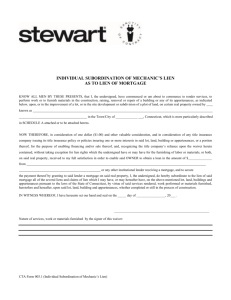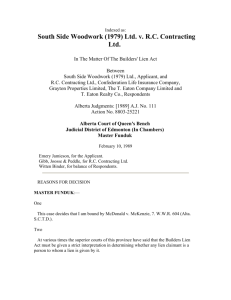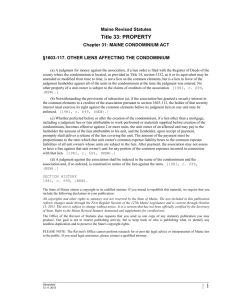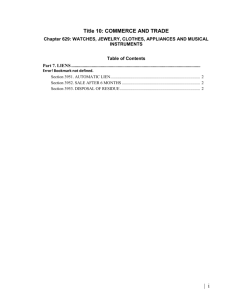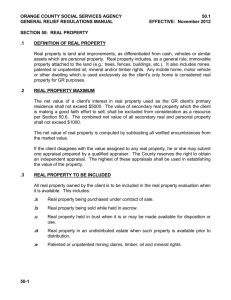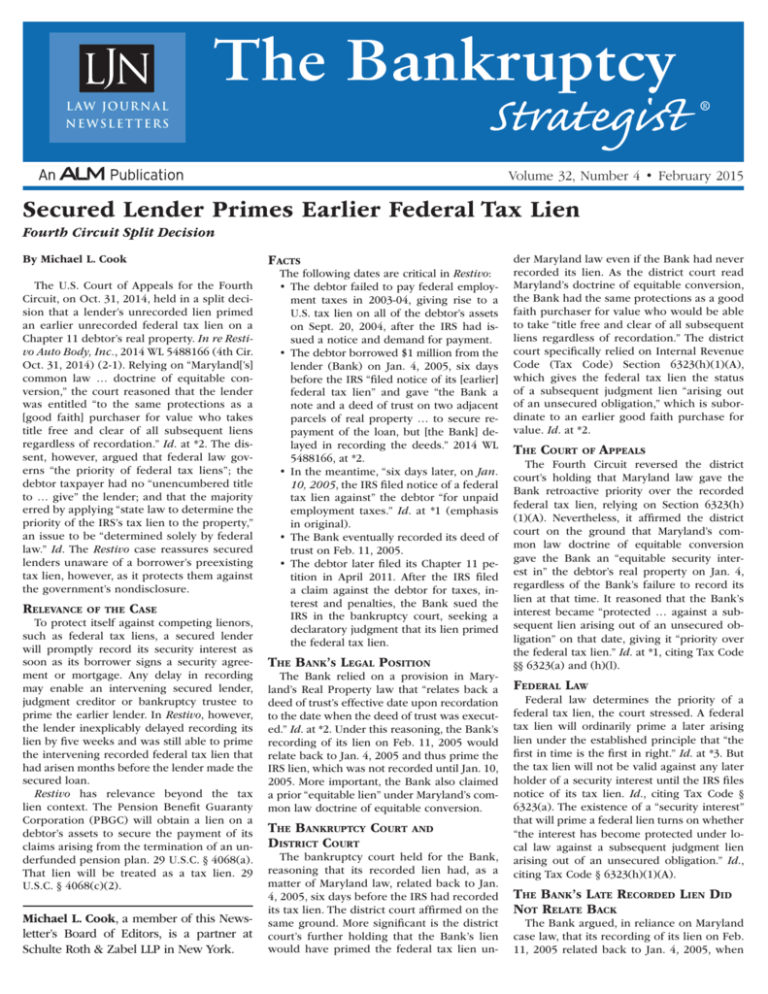
L aw J o u r n a l
Newsletters
The Bankruptcy
Strategist
®
Volume 32, Number 4 • February 2015
Secured Lender Primes Earlier Federal Tax Lien
Fourth Circuit Split Decision
Facts
By Michael L. Cook
The U.S. Court of Appeals for the Fourth
Circuit, on Oct. 31, 2014, held in a split decision that a lender’s unrecorded lien primed
an earlier unrecorded federal tax lien on a
Chapter 11 debtor’s real property. In re Restivo Auto Body, Inc., 2014 WL 5488166 (4th Cir.
Oct. 31, 2014) (2-1). Relying on “Maryland[’s]
common law … doctrine of equitable conversion,” the court reasoned that the lender
was entitled “to the same protections as a
[good faith] purchaser for value who takes
title free and clear of all subsequent liens
regardless of recordation.” Id. at *2. The dissent, however, argued that federal law governs “the priority of federal tax liens”; the
debtor taxpayer had no “unencumbered title
to … give” the lender; and that the majority
erred by applying “state law to determine the
priority of the IRS’s tax lien to the property,”
an issue to be “determined solely by federal
law.” Id. The Restivo case reassures secured
lenders unaware of a borrower’s preexisting
tax lien, however, as it protects them against
the government’s nondisclosure.
Relevance
of the
Case
To protect itself against competing lienors,
such as federal tax liens, a secured lender
will promptly record its security interest as
soon as its borrower signs a security agreement or mortgage. Any delay in recording
may enable an intervening secured lender,
judgment creditor or bankruptcy trustee to
prime the earlier lender. In Restivo, however,
the lender inexplicably delayed recording its
lien by five weeks and was still able to prime
the intervening recorded federal tax lien that
had arisen months before the lender made the
secured loan.
Restivo has relevance beyond the tax
lien context. The Pension Benefit Guaranty
Corporation (PBGC) will obtain a lien on a
debtor’s assets to secure the payment of its
claims arising from the termination of an underfunded pension plan. 29 U.S.C. § 4068(a).
That lien will be treated as a tax lien. 29
U.S.C. § 4068(c)(2).
Michael L. Cook, a member of this Newsletter’s Board of Editors, is a partner at
Schulte Roth & Zabel LLP in New York.
The following dates are critical in Restivo:
•The debtor failed to pay federal employment taxes in 2003-04, giving rise to a
U.S. tax lien on all of the debtor’s assets
on Sept. 20, 2004, after the IRS had issued a notice and demand for payment.
•The debtor borrowed $1 million from the
lender (Bank) on Jan. 4, 2005, six days
before the IRS “filed notice of its [earlier]
federal tax lien” and gave “the Bank a
note and a deed of trust on two adjacent
parcels of real property … to secure repayment of the loan, but [the Bank] delayed in recording the deeds.” 2014 WL
5488166, at *2.
•In the meantime, “six days later, on Jan.
10, 2005, the IRS filed notice of a federal
tax lien against” the debtor “for unpaid
employment taxes.” Id. at *1 (emphasis
in original).
•The Bank eventually recorded its deed of
trust on Feb. 11, 2005.
•The debtor later filed its Chapter 11 petition in April 2011. After the IRS filed
a claim against the debtor for taxes, interest and penalties, the Bank sued the
IRS in the bankruptcy court, seeking a
declaratory judgment that its lien primed
the federal tax lien.
The Bank’s Legal Position
The Bank relied on a provision in Maryland’s Real Property law that “relates back a
deed of trust’s effective date upon recordation
to the date when the deed of trust was executed.” Id. at *2. Under this reasoning, the Bank’s
recording of its lien on Feb. 11, 2005 would
relate back to Jan. 4, 2005 and thus prime the
IRS lien, which was not recorded until Jan. 10,
2005. More important, the Bank also claimed
a prior “equitable lien” under Maryland’s common law doctrine of equitable conversion.
The Bankruptcy Court
District Court
and
The bankruptcy court held for the Bank,
reasoning that its recorded lien had, as a
matter of Maryland law, related back to Jan.
4, 2005, six days before the IRS had recorded
its tax lien. The district court affirmed on the
same ground. More significant is the district
court’s further holding that the Bank’s lien
would have primed the federal tax lien un-
der Maryland law even if the Bank had never
recorded its lien. As the district court read
Maryland’s doctrine of equitable conversion,
the Bank had the same protections as a good
faith purchaser for value who would be able
to take “title free and clear of all subsequent
liens regardless of recordation.” The district
court specifically relied on Internal Revenue
Code (Tax Code) Section 6323(h)(1)(A),
which gives the federal tax lien the status
of a subsequent judgment lien “arising out
of an unsecured obligation,” which is subordinate to an earlier good faith purchase for
value. Id. at *2.
The Court
of
Appeals
The Fourth Circuit reversed the district
court’s holding that Maryland law gave the
Bank retroactive priority over the recorded
federal tax lien, relying on Section 6323(h)
(1)(A). Nevertheless, it affirmed the district
court on the ground that Maryland’s common law doctrine of equitable conversion
gave the Bank an “equitable security interest in” the debtor’s real property on Jan. 4,
regardless of the Bank’s failure to record its
lien at that time. It reasoned that the Bank’s
interest became “protected … against a subsequent lien arising out of an unsecured obligation” on that date, giving it “priority over
the federal tax lien.” Id. at *1, citing Tax Code
§§ 6323(a) and (h)(l).
Federal Law
Federal law determines the priority of a
federal tax lien, the court stressed. A federal
tax lien will ordinarily prime a later arising
lien under the established principle that “the
first in time is the first in right.” Id. at *3. But
the tax lien will not be valid against any later
holder of a security interest until the IRS files
notice of its tax lien. Id., citing Tax Code §
6323(a). The existence of a “security interest”
that will prime a federal lien turns on whether
“the interest has become protected under local law against a subsequent judgment lien
arising out of an unsecured obligation.” Id.,
citing Tax Code § 6323(h)(1)(A).
The Bank’s Late Recorded Lien Did
Not Relate Back
The Bank argued, in reliance on Maryland
case law, that its recording of its lien on Feb.
11, 2005 related back to Jan. 4, 2005, when
LJN’s The Bankruptcy Strategist
the debtor had signed the deed of trust. Disagreeing, the Fourth Circuit held that the district court “misinterpreted § 6323(h)(1)(A) in
ruling that [Maryland’s statutory law] gave …
[the Bank] a prior security interest” because
the Tax Code “explicitly” precluded “the application of a relation-back rule.” Id. at *7.
The vague language of the relevant section
“requires … the evaluation of” the Bank’s
“security interest … as of the date that notice
of the federal tax lien was filed.” Id. at *6. Because the Bank “had not, as of that date [ Jan.
10, 2005], recorded its” lien, “the relation
back provision” in the Maryland Real Property statute did not yet apply. Id. In other
words, the Bank’s lien could only relate back
to a prior time if the Bank had perfected (i.e.,
recorded) that lien at a point prior to the recording of the federal tax lien.
Maryland’s Doctrine of
Equitable Conversion
The Fourth Circuit affirmed the district
court, however, on the ground that the Bank
had a prior “security interest,” consistent with
Tax Code Section 6323(h)(1)(A), by applying
the Maryland “doctrine of equitable conversion.” Id. at *8. It agreed with the district
court that “under Maryland law, … the holder
of an equitable title or interest in property,
by virtue of an unrecorded contract of sale,
has a claim superior to that of a creditor obtaining a judgment subsequent to the execution of the contract.” Moreover, “the doctrine
[of equitable conversion] applies to lenders
whose interests are secured by mortgages
or deeds of trust.” Id., quoting StebbinsAnderson Co. v. Bolton, 117 A.2d 908, 910
(Md. 1955). In short, federal law (Tax Code §
6323(h)(1)(A)) makes Maryland law applicable, and under that law, “judgment creditors
[are} ‘subject to prior, undisclosed equities.’”
Id., quoting Wash. Mut. Bank v. Homan, 974
A.2d 376, 389 (Md. Ct. Spec. App. 2009), citing Stebbins-Anderson. Maryland law thus
“protects equitable security interests against
subsequent judgment-creditor liens.” Id. at
*8. The Bank, as a good-faith holder of a
deed of trust, would be “entitled to the protections available to a good faith purchaser
for value.” Id., citing Wash. Mut. Bank, 974
A.2d at 396-98.
Moreover, reasoned the Fourth Circuit,
Maryland is not unique. Both Texas and New
York courts have held that a lender with a
deed of trust primed a debtor’s subsequent
judgment lien creditor. Id. at *10.
Federal Law Makes
State Law Applicable
The Bank here took equitable title to the
debtor’s real property when the debtor signed
the deed of trust on Jan. 4, 2005, giving the
Bank “priority over” any of the debtor’s later
“judgment-creditor lienholders.” Id. Because
the Tax Code subordinates a federal tax lien
to a deed of trust “that has become protected
February 2015
‘against a subsequent judgment lien arising
out of an unsecured obligation,’” Tax Code
§ 6323 (h)(1)(A), the Bank’s “equitable security interest,” arising on Jan. 4, 2005, primed
the later federal tax lien recorded on Jan. 11,
2005. Id. Regardless of when the federal tax
lien rose, “Congress … amended § 6323(a) to
make unrecorded tax liens ineffective against
holders of security interests … .” Id. In short,
the Tax Code “subordinates unrecorded tax
liens to security interests, and it defines security interests according to their protection
under state law against subsequent judgment
liens.” Id., citing Tax Code § 6323(h)(1)(A).
Maryland law, too, confirmed that “recordation” of an equitable interest such as the one
held by the Bank here “is irrelevant to the [equitable] doctrine’s application.” Id.
The majority of the Fourth Circuit panel rejected the dissent’s argument that “the IRS’s
tax lien ‘was not a subsequent lien.’” Id. at
*10n. Instead, the majority held that the “Tax
Code subordinates unrecorded tax liens to
security interests” that are protected “under
state law against subsequent judgment liens.”
Id. at *10, citing Tax Code § 6323(h)(1)(A).
The dissent accused the majority of mistakenly applying state law, “blurr[ing] the line
between the IRS and a judgment creditor and
between a tax lien and a judgment lien without
citing any precedent that allows it to do so.” Id.
at *13. The dissent stressed that there was “no
judgment lien here. There is a tax lien. And its
priority … is determined solely by federal law.”
Id. Because the federal tax lien “predates” the
Bank’s lien, explained the dissent, it “arose and
became protected at an earlier date” and was
“not a subsequent lien.” Id. at *14.
Comment
The dissent was right about one principle:
“the priority of federal tax liens is governed
by federal law.” Id. at *13. But that principle
does not mean the federal government always
wins or even that it should win in Restivo. According to the U.S. Supreme Court, “[u]nless
some federal interest requires a different result, there is no reason why [property] interests should be analyzed differently simply
because an interested party is involved in a
bankruptcy [case].” Raleigh v. Ill. Dept. of Revenue, 530 U.S. 15, 20 (2000), quoting Butner
v. United States, 440 U.S. 48, 55 (1979).
Federal law here gave the Bank a “semi-super
priority” under Tax Code § 6323(a): A federal
tax lien is not “valid against any purchaser [or]
holder of a security interest … until” the IRS
files notice of its lien. Section 6323(h)(i) defines “security interest” to include “any interest
in property … for the purpose of securing payment … .” That “security interest” exists when,
among other things, it “has become protected
under local law against a subsequent judgment
lien arising out of an unsecured obligation.”
Maryland law in Restivo, expressly made applicable by Tax Code Section 6323(h)(l), enabled
the Bank to prime the unrecorded federal tax
lien. See generally Steven R. Mather & Paul H.
Weisman, 637-2nd T.M., Federal Tax Collections
Procedure – Liens, Levies, Suits and Third Party
Liability A-29–A-32 (2013), citing Treasury Regs.
§ 301.6323(h)-(l)(a)(2).
One commentator’s explanation of the federal tax lien priority, 13 years ago, shows why
the Bank had to prevail in Restivo:
As a general rule, “first in time, first in
right” prevails. The Federal Tax Lien Act
of 1966 established the priorities of the
Government as compared to other creditors, both secured and unsecured. IRC §
6323 sets forth the rules to apply in determining priority amongst creditors. It
divides creditors into four classes. 1). The
first level of creditor is those creditors
who receive priority status only if their
liens are perfected before the Notice of
Federal Tax Lien is filed. 2) The second
level of creditors is given “semi-super”
priority status in IRC § 6323(c). They have
limited priority over a perfected federal
tax lien, provided that their interests are
created pursuant to a written agreement
which is entered into before filing of the
Notice of Federal Tax Lien, and is protected under local law against subsequent
judgment lien creditors. …
… The Government knows that if it publicizes a taxpayer’s tax obligations by filing notice of liens, the taxpayer’s credit
will evaporate and the chances of earning enough to pay off the tax obligation
will be significantly impaired. Therefore,
it has been the practice of tax authorities
to exercise forbearance in filing notices
of lien in cases when there appears to be
a reasonable possibility that the business
can regain financial stability. A general
creditor is anyone who has not perfected
their interest in the debtor’s assets, either
by mortgage, security interest, or judgment. It has been contended that the IRS,
assured in any event of a priority over
general unsecured creditors, has preferred to induce them, by nondisclosure,
to provide the financing that will improve
the taxpayer’s chances of at least paying
off the federal taxes. Taxpayers are first
encouraged to borrow the money from
an outside source before exploring other
payment possibilities.
D. A. Schmudde, Federal Tax Liens 67-68;
73 (4th rev. ed. 2001) (emphasis added). In
Restivo, the IRS may have failed to record its
lien with the hope that a lender like the Bank
would help the debtor regain its viability and
pay its outstanding taxes.
—❖—
Reprinted with permission from the February 2015 edition of the
Law Journal Newsletters. © 2015 ALM Media Properties, LLC. All rights reserved. Further duplication without permission is prohibited. For information, contact 877.257.3382 or
reprints@alm.com. #081-02-15-04

